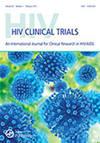HBV coinfection is associated with reduced CD4 response to antiretroviral treatment in pregnancy
Q2 Medicine
引用次数: 9
Abstract
Objective: To evaluate the impact of Hepatitis B virus (HBV) coinfection on response to antiretroviral treatment in pregnant women with HIV. Methods: Retrospective analysis of a large case series of pregnant women with HIV in Italy; outcome measures were CD4 changes, HIV viral load, and main pregnancy outcomes (preterm delivery, low birthweight, intrauterine growth restriction, mode of delivery, and major birth defects). Results: Rate of HBV coinfection among 1462 pregnancies was 12.0%. Compared to the HBV-uninfected, HBV-coinfected women had a significantly lower median CD4 cell gain between first and third trimester (26.5 vs. 60 cells/mm3, p = 0.034), with similar rate of undetectable (<50 copies/ml) HIV-RNA at third trimester (70.5% vs. 65.2%, p = 0.229), and no differences in all the main maternal and infant outcomes. A multivariable linear regression analysis identified four variables significantly and independently associated with a lower CD4 response in pregnancy: HBV coinfection (–35 cells/mm3), being on antiretroviral treatment at conception (–59.7 cells/mm3), AIDS status (–59.8 cells/mm3) and higher first CD4 levels in pregnancy (–0.24 cells per unitary CD4 increase). Conclusions: HBV coinfection had no adverse influence on the main pregnancy outcomes or on HIV viral load suppression in late pregnancy but was associated with a significantly reduced CD4 response in pregnancy. This effect might have clinical relevance, particularly in women with advanced immune deterioration.HBV合并感染与妊娠期CD4对抗逆转录病毒治疗的反应降低有关
目的:评价乙型肝炎病毒(HBV)合并感染对HIV孕妇抗逆转录病毒治疗疗效的影响。方法:对意大利一大批HIV感染孕妇进行回顾性分析;结果测量是CD4变化、HIV病毒载量和主要妊娠结局(早产、低出生体重、宫内生长受限、分娩方式和主要出生缺陷)。结果:1462例妊娠中HBV合并感染率为12.0%。与未感染乙肝病毒的妇女相比,合并感染乙肝病毒的妇女在妊娠早期和晚期的CD4细胞增加中位数显著降低(26.5 vs. 60个细胞/mm3, p = 0.034),在妊娠晚期的HIV-RNA检测不到率相似(<50拷贝/ml) (70.5% vs. 65.2%, p = 0.229),并且在所有主要的母婴结局中没有差异。一项多变量线性回归分析确定了与妊娠期较低CD4应答显著且独立相关的四个变量:HBV合并感染(-35个细胞/mm3)、妊娠期接受抗逆转录病毒治疗(-59.7个细胞/mm3)、艾滋病状态(-59.8个细胞/mm3)和妊娠期较高的首次CD4水平(每单位CD4增加-0.24个细胞)。结论:HBV合并感染对妊娠后期的主要妊娠结局或HIV病毒载量抑制无不良影响,但与妊娠期CD4应答显著降低相关。这种效果可能具有临床意义,特别是对晚期免疫功能恶化的妇女。
本文章由计算机程序翻译,如有差异,请以英文原文为准。
求助全文
约1分钟内获得全文
求助全文
来源期刊

HIV Clinical Trials
医学-传染病学
CiteScore
1.76
自引率
0.00%
发文量
0
审稿时长
>12 weeks
期刊介绍:
HIV Clinical Trials is devoted exclusively to presenting information on the latest developments in HIV/AIDS clinical research. This journal enables readers to obtain the most up-to-date, innovative research from around the world.
 求助内容:
求助内容: 应助结果提醒方式:
应助结果提醒方式:


